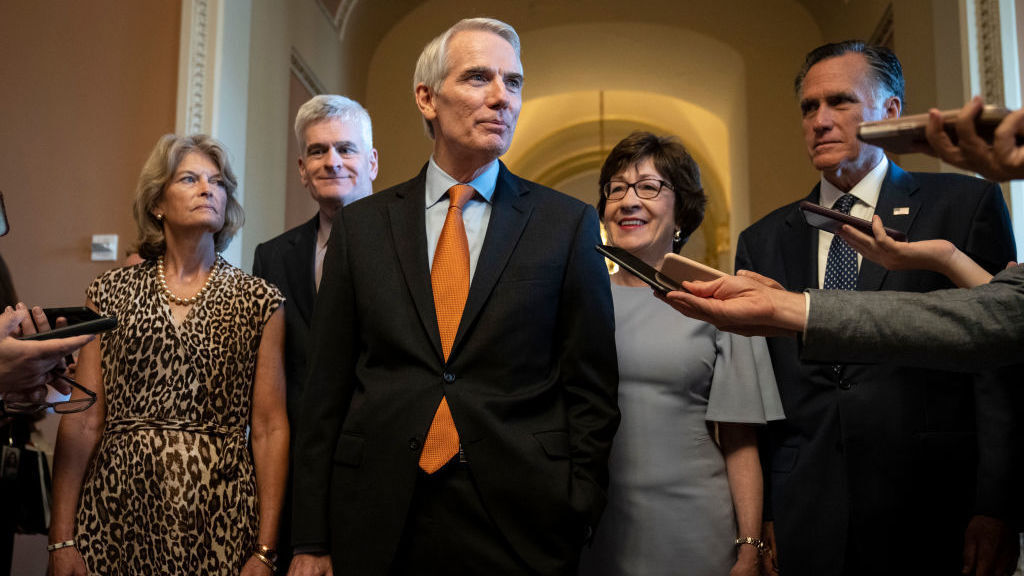
Bipartisan Senate Negotiators Say They Reach A Deal On Infrastructure After Hiccups


The lead GOP negotiators on the bipartisan infrastructure legislation — Sens. Lisa Murkowski (from left), Bill Cassidy, Rob Portman, Susan Collins and Mitt Romney — speak to reporters Wednesday at the U.S. Capitol. Drew Angerer/Getty Images hide caption
toggle caption
Drew Angerer/Getty Images

The lead GOP negotiators on the bipartisan infrastructure legislation — Sens. Lisa Murkowski (from left), Bill Cassidy, Rob Portman, Susan Collins and Mitt Romney — speak to reporters Wednesday at the U.S. Capitol.
Drew Angerer/Getty Images
Bipartisan Senate negotiators said they have reached a deal on an infrastructure package, and a procedural vote on the measure is expected to take place Wednesday evening.
GOP Sen. Rob Portman of Ohio told reporters the group reached agreement on the major issues and were still working on legislative text. “We are prepared to move forward,” Portman said after the Republicans working on the deal met with Senate Minority Leader Mitch McConnell, R-Ky.
Sen. Kyrsten Sinema of Arizona, who was leading talks for the 10 Democrats at the negotiating table, told reporters on Capitol Hill that “we are very excited to have a deal” and said that she had spoken with President Biden about it. Biden later told reporters he was “feeling confident” about the bill.
In an address Wednesday afternoon at a truck plant in Pennsylvania, Biden added that he was working with Democrats and Republicans on the deal because “while there’s a lot we don’t agree on, I believe that we should be able to work together on the few things we do agree on.”
The announcement comes a week after a failed test vote on the deal, with Republicans saying Senate Majority Leader Chuck Schumer, D-N.Y., was moving too quickly.
The bill is expected to be around $1.2 trillion over eight years with roughly $559 billion in new spending, but the final details on key components were still being worked out.

Republican Sen. Susan Collins of Maine, one of the 10 GOP lawmakers in the talks, said there is $65 billion for broadband deployment in the bill. She acknowledged “it has not been easy” to get a deal, “but we have reached agreement on the major issues.”
Portman said the bill is paid for, including using funds from combating fraud in unemployment assistance programs. The group is awaiting a final price tag from the Congressional Budget Office.
Sen. Jon Tester of Montana, one of the Democrats involved in the talks, told reporters that the final text has not yet been fully circulated, but he expects the final agreement will be completed Wednesday.
Democrats expect to discuss the agreement at a weekly policy meeting in the afternoon ahead of a vote as early as Wednesday evening.

Sen. Joe Manchin, D-W.Va., said he expects the first vote will be on placeholder legislation that will later be amended to include the full text of the agreement. That process is not uncommon; it allows the Senate to move ahead while staff drafts the legal legislative language necessary for a bill to come up for a vote.
The No. 2 Senate GOP leader, John Thune of South Dakota, told reporters that Republicans still wanted to see the final details, but he was open to voting for the bill.
“I want to encourage this because I think it’s good to have a bipartisan exercise around here once in a while on something that matters, and it’s important to people in the country,” Thune said. He thought leaders would work on a deal to consider amendments so both sides could try to add elements.

Separately, Senate Democrats continue to try to get agreement among all 50 of the members in their caucus on a $3.5 trillion spending package that includes the president’s domestic priorities that some are calling “human infrastructure,” such as an extension of the child care tax credit, climate change provisions, health care programs and potentially immigration reforms.
They plan to use a process known as reconciliation to move that package through the chamber to avoid a Republican filibuster. McConnell has vowed no GOP members would back that massive package, so there is no room for error among Democrats in the narrowly divided Senate.
House Speaker Nancy Pelosi, D-Calif., told reporters she was encouraged by a likely Senate deal but would not commit to passing it as is until the House of Representatives has a chance to review it. “We are rooting for it. We are hoping for the best,” she said.
Pelosi also reiterated her position that she will not bring it up for a vote until after the Senate passes a budget resolution outlining the terms of the $3.5 trillion reconciliation package.
NPR’s Kelsey Snell, Susan Davis and Claudia Grisales contributed to this report.
Source: https://www.npr.org/2021/07/28/1021768174/bipartisan-senate-negotiators-say-they-reach-a-deal-on-infrastructure-after-hicc















